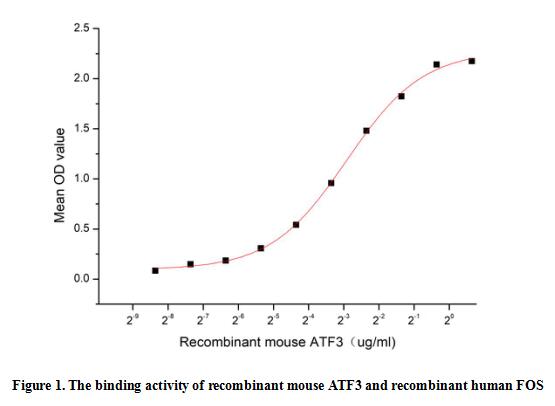Active Activating Transcription Factor 3 (ATF3)
Cyclic AMP-dependent Transcription Factor ATF3
- Product No.APC303Mu01
- Organism SpeciesMus musculus (Mouse) Same name, Different species.
- Buffer FormulationPBS, pH7.4, containing 0.01% SKL, 5% Trehalose.
- TraitsFreeze-dried powder
- Purity> 90%
- Isoelectric Point8.8
- ApplicationsCell culture; Activity Assays.
- Download Instruction Manual
- UOM 10µg50µg 200µg 1mg 5mg
-
FOB
US$ 270
For more details, please contact local distributors!US$ 675
For more details, please contact local distributors! US$ 1350
For more details, please contact local distributors! US$ 4050
For more details, please contact local distributors! US$ 10125
For more details, please contact local distributors!
ACTIVITY TEST of the Active Activating Transcription Factor 3 (ATF3)

Activating transcription factor 3 (ATF3) is a stress-induced transcription factor that plays vital roles in modulating metabolism, immunity and oncogenesis. ATF3 acts as a hub of the cellular adaptive-response network. Multiple extracellular signals, such as endoplasmic reticulum (ER) stress, cytokines, chemokines, and LPS, are connected to ATF3 induction. Proto-oncogene c-Fos can bind to ATF3 to regulate signal transduction, cell proliferation and differentiation. Thus a functional ELISA assay was conducted to detect the interaction of recombinant mouse ATF3 and recombinant human FOS. Briefly, ATF3 was diluted serially in PBS with 0.01% BSA (pH 7.4). Duplicate samples of 100 μl were then transferred to FOS-coated microtiter wells and incubated for 1h at 37℃. Wells were washed with PBST and incubated for 1h with anti-ATF3 pAb, then aspirated and washed 3 times. After incubation with HRP labelled secondary antibody for 1h at 37℃, wells were aspirated and washed 5 times. With the addition of substrate solution, wells were incubated 15-25 minutes at 37℃. Finally, add 50 µL stop solution to the wells and read at 450/630nm immediately. The binding activity of recombinant mouse ATF3 and recombinant human FOS was shown in Figure 1, the EC50 for this effect is 0.13 ug/mL.
USAGE of the Active Activating Transcription Factor 3 (ATF3)
Reconstitute in 10mM PBS (pH7.4) to a concentration of 0.1-1.0 mg/mL. Do not vortex.
STORAGE of the Active Activating Transcription Factor 3 (ATF3)
Avoid repeated freeze/thaw cycles. Store at 2-8°C for one month. Aliquot and store at -80°C for 12 months.
STABILITY of the Active Activating Transcription Factor 3 (ATF3)
The thermal stability is described by the loss rate. The loss rate was determined by accelerated thermal degradation test, that is, incubate the protein at 37°C for 48h, and no obvious degradation and precipitation were observed. The loss rate is less than 5% within the expiration date under appropriate storage condition.
INCREMENT SERVICES
BCA Protein Quantification Kit
Molecular Mass Marker for Protein
Monoclonal Antibody Customized Service
Polyclonal Antibody Customized Service
Protein Activity Test Experiment Service
Electrophoretic Mobility Shift Assay (EMSA) Experiment Service
Buffer
Lentivirus Packaging Experiment Service
Adenovirus Packaging Experiment Service
Real Time PCR Experimental Service
Spike RBD Protein (S-RBD)
Protein G
Protein A
Related products
| Catalog No. | Organism species: Mus musculus (Mouse) | Applications (RESEARCH USE ONLY!) |
| RPC303Mu02 | Recombinant Activating Transcription Factor 3 (ATF3) | Positive Control; Immunogen; SDS-PAGE; WB. |
| APC303Mu01 | Active Activating Transcription Factor 3 (ATF3) | Cell culture; Activity Assays. |
| RPC303Mu01 | Recombinant Activating Transcription Factor 3 (ATF3) | Positive Control; Immunogen; SDS-PAGE; WB. |
| PAC303Mu02 | Polyclonal Antibody to Activating Transcription Factor 3 (ATF3) | WB; IHC; ICC; IP. |
| PAC303Mu01 | Polyclonal Antibody to Activating Transcription Factor 3 (ATF3) | WB; IHC; ICC; IP. |
| SEC303Mu | ELISA Kit for Activating Transcription Factor 3 (ATF3) | Enzyme-linked immunosorbent assay for Antigen Detection. |
| LMC303Mu | Multiplex Assay Kit for Activating Transcription Factor 3 (ATF3) ,etc. by FLIA (Flow Luminescence Immunoassay) | FLIA Kit for Antigen Detection. |
| PGC303Mu01 | Primer Pair for Activating Transcription Factor 3 (ATF3) | PCR |

